 Petzlover
Petzlover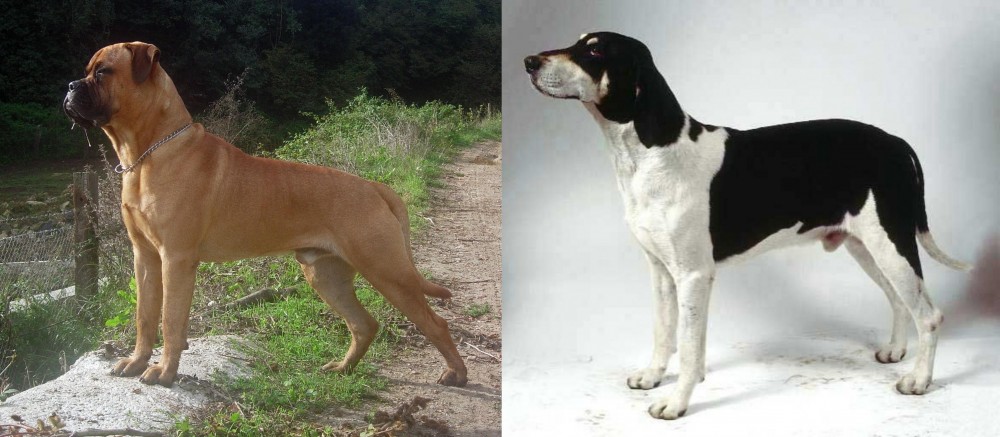 Bullmastiff is originated from United Kingdom but Francais Blanc et Noir is originated from France. Both Bullmastiff and Francais Blanc et Noir are having almost same height. Bullmastiff may weigh 27 kg / 60 pounds more than Francais Blanc et Noir. Bullmastiff may live 3 years less than Francais Blanc et Noir. Bullmastiff may have more litter size than Francais Blanc et Noir. Bullmastiff requires Low Maintenance. But Francais Blanc et Noir requires Moderate Maintenance
Bullmastiff is originated from United Kingdom but Francais Blanc et Noir is originated from France. Both Bullmastiff and Francais Blanc et Noir are having almost same height. Bullmastiff may weigh 27 kg / 60 pounds more than Francais Blanc et Noir. Bullmastiff may live 3 years less than Francais Blanc et Noir. Bullmastiff may have more litter size than Francais Blanc et Noir. Bullmastiff requires Low Maintenance. But Francais Blanc et Noir requires Moderate Maintenance
 The Old English Mastiff as well as the Bulldog are the breeds behind the Bull Mastiff. The Bullmastiff was originally developed in England around the 1860’s. Gamekeepers in England wanted a large, brave, robust dog which could help with keeping poachers away from their large estates which kept game.
The Old English Mastiff as well as the Bulldog are the breeds behind the Bull Mastiff. The Bullmastiff was originally developed in England around the 1860’s. Gamekeepers in England wanted a large, brave, robust dog which could help with keeping poachers away from their large estates which kept game.
As these large estates dwindled, so did the need for the services of the Bullmastiff and later they were simply bred to be family companions. As more Old English Mastiffs were bred, the dog became lighter, so that light tan or fawn became the preferred color.
The breed was officially recognized by the English Kennel Club in 1924, and the American Kennel Club in 1933.
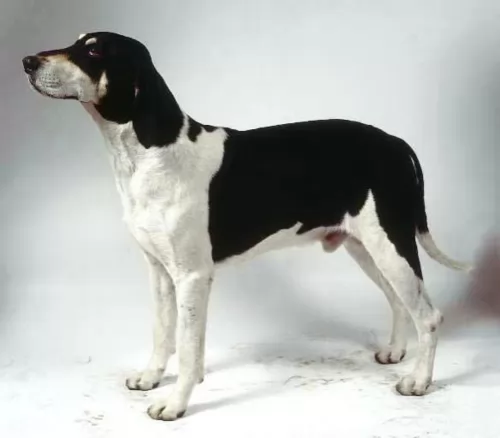 Translated from the French Chien Francais Blanc et Noir, is the French White and Black Hound. His ancestry goes back before the French Revolution to the old Hound of Saintonge and the Gascon Saintongeois. The Francais Blanc et Noir was bred to be a hunting dog and he is a scent hound. They were dogs that went hunting in packs, mostly for Roe and Red deer. In the late 19th Century, the Gascon Saintongeois was crossed with the Poitevin and the result was the Francais Blanc et Noir.
Translated from the French Chien Francais Blanc et Noir, is the French White and Black Hound. His ancestry goes back before the French Revolution to the old Hound of Saintonge and the Gascon Saintongeois. The Francais Blanc et Noir was bred to be a hunting dog and he is a scent hound. They were dogs that went hunting in packs, mostly for Roe and Red deer. In the late 19th Century, the Gascon Saintongeois was crossed with the Poitevin and the result was the Francais Blanc et Noir.
The breed was recognized in 1957 and by 2009 there were about 2000 dogs registered with the Federation Cynoloqique Interenationale. There are three types of the Francais line. They are the Chien Francais Tricolor and Chien Francais Blanc et Orange. The Blanc et Noir was bred as a hunting dog and they remain that especially in France. However, they are also very popular in dog shows. Because so many dogs belonged to hunters who felt no compulsion to register them, they were not recognized internationally for many decades later than they should have been.
Following the Second World War, breeding programs were in chaos and hunters were abandoning dogs that they could not feed. The military killed many dogs also. The Chien Francais Blanc et Noir saw its ranks greatly depleted but the breed survived. After being recognized in 1957 by the CKC and FCI, they gained international attention for the first time. Even though the breed is rare its numbers are greater than either of the other Chien Francais types. The breed registers 200 to 400 new dogs every year.
They are still endangered though because there are very few dogs left outside of France.
The UKC has recognized the breed but the AKC doesn’t.
 Bullmastiffs are large, brachycephalic dogs, and heights are between 61 and 68cm and the dog weight anything between 41 – 59kg. While it isn’t particularly tall, the dog is thickly set with a deep chest and strong, muscular legs. The Bull Mastiff has a powerful build and plenty of strength with an imposing look on his face. He is a powerful, active breed with a short coat which is also weather resistant and can be any shade of fawn, red or brindle.
Bullmastiffs are large, brachycephalic dogs, and heights are between 61 and 68cm and the dog weight anything between 41 – 59kg. While it isn’t particularly tall, the dog is thickly set with a deep chest and strong, muscular legs. The Bull Mastiff has a powerful build and plenty of strength with an imposing look on his face. He is a powerful, active breed with a short coat which is also weather resistant and can be any shade of fawn, red or brindle.
The dog has a black muzzle and the skull is large and square. The ears are set high and are short and floppy. The tail was once docked, giving the dog an even more distinctive, powerful appearance, but these days, due to regulations, the tail is left long.
The Bullmastiff is a loyal, devoted, fearless, protective dog. When he belongs to a human family, he becomes a companion but a fierce protector too, being a territorial dog. They love being with their family and can be good with children too, and even other pets, but proper training and socialization will be important. They aren’t aggressive around strangers, though he does make a wonderful guard dog.
He is intelligent and stubborn and if you don’t want him becoming destructive, even though he is a low-energy dog, you will need to exercise him and walk him every day.
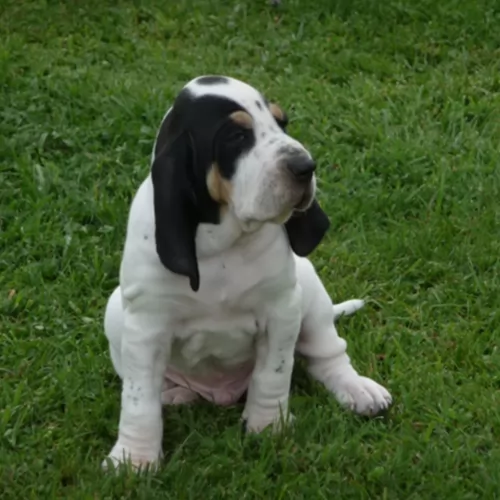 Being a pack hunting dog, the Francais Blanc et Noir is muscular and lean. A long legged athletic breed with long drop ears, a domed head, and flews overhanging the lower lip. The coat is black and white, with black and blue ticking. There are tan dot on the cheeks and above the eyes and also below the tail. These spots of pale tan color can also appear on the dog’s legs. The Francais Blanc et Noir is known for its scenting ability and for its great voice. With its athletic build it is also known for its ability to persevere
Being a pack hunting dog, the Francais Blanc et Noir is muscular and lean. A long legged athletic breed with long drop ears, a domed head, and flews overhanging the lower lip. The coat is black and white, with black and blue ticking. There are tan dot on the cheeks and above the eyes and also below the tail. These spots of pale tan color can also appear on the dog’s legs. The Francais Blanc et Noir is known for its scenting ability and for its great voice. With its athletic build it is also known for its ability to persevere
 Contrary to his formidable looks, the Bullmastiff is a gentle, affectionate pet when he has been properly socialized. He is a great pet for families and will guard them with his life. He is loyal and devoted but can be somewhat aloof, particularly with strangers.
Contrary to his formidable looks, the Bullmastiff is a gentle, affectionate pet when he has been properly socialized. He is a great pet for families and will guard them with his life. He is loyal and devoted but can be somewhat aloof, particularly with strangers.
He isn’t a highly energetic dog and he is more or less low maintenance and easy-going. Feed him correctly, give him a nice, warm sleeping spot to call his own and give him attention like he deserves as a family member. The Bullmastiff will reward you by being a solid and devoted companion.
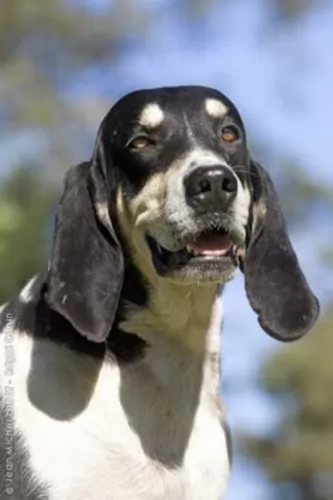 They are good with children as long as the children are not overly rambunctious.
They are good with children as long as the children are not overly rambunctious.
He is a large active dog that would not be adaptable to apartment or city life.
The breed is very smart and easily trainable.
 The Bullmastiff is a generally healthy breed, but even so, the breed is known for having to contend with certain health issues. He doesn’t have a particularly long life span either and can live to be about 10, ll or 12 years of age. Some of the more common illnesses to look out for include -
The Bullmastiff is a generally healthy breed, but even so, the breed is known for having to contend with certain health issues. He doesn’t have a particularly long life span either and can live to be about 10, ll or 12 years of age. Some of the more common illnesses to look out for include -
This is a condition where the thighbone doesn’t fit properly into the hip joint. The troublesome part is that it can lead to arthritis, pain and lameness for your pet.
This is a worrisome, life-threatening condition for a dog, particularly for large, deep-chested dogs such as your Bullmastiff. Instead of feeding your Mastiff one large meal, it is recommended to feed him 2 smaller meals. Bloat occurs when the stomach is distended with gas or air and twists, restricting the normal return of blood to the heart.
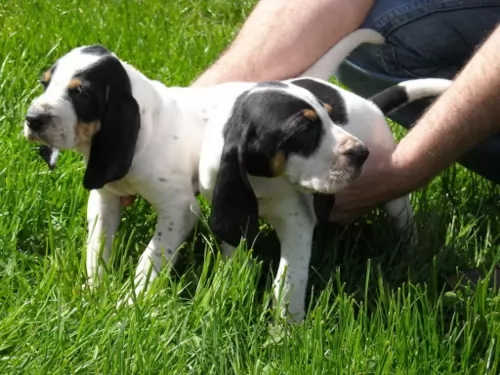 The Francais Blanc et Noir has the propensity for several minor and a few major health problems. These include:
The Francais Blanc et Noir has the propensity for several minor and a few major health problems. These include:
Can lead to death if not treated immediately. Stomach twists and distends.
Can lead to arthritis and lameness if not treated.
These can be avoided if ears are checked and cleaned after each hunt and after exercise.
The breed is susceptible to the non-fatal type. Check for mites regularly.
Both seasonal and food potentially.
 The Bullmastiff has a short dense coat which is looked upon as low-maintenance. He will require a brushing twice a week, being a light to average shedder. He is a dog that tends to drool quite a bit so you may need to wipe away slobber from time to time. Because his face has wrinkles, check the creases to ensure they remain free of dirt and food particles to ward off infection.
The Bullmastiff has a short dense coat which is looked upon as low-maintenance. He will require a brushing twice a week, being a light to average shedder. He is a dog that tends to drool quite a bit so you may need to wipe away slobber from time to time. Because his face has wrinkles, check the creases to ensure they remain free of dirt and food particles to ward off infection.
Check his ears at the same time, brush his teeth at least twice a week with special dog-toothpaste and brush and keep the nails trimmed.
Your large Bullmastiff will require high-quality commercial dog food but he will also need some home-made food in between such as rice, vegetables and meat. He is a large dog and will have to get an intake of raw meat too. Dogs denied raw meat can end up with skin problems as well as other health issues.It is better to feel your Bullmastiff smaller meals than to give him one large meal which he scoffs down quickly. Smaller meals will help prevent the most dangerous illness known as Bloat.
Ensure he has a steady supply of fresh, cool water.
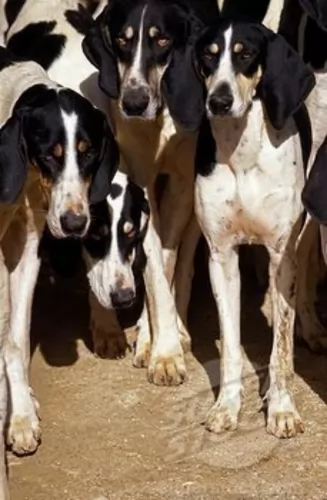 Until a year to 18 months feed two to three times per day two to two and one half cups of high quality dry dog food.
Until a year to 18 months feed two to three times per day two to two and one half cups of high quality dry dog food.
After 18 months of age feed the adult at least twice a day about three to four and one half cups of high quality dry dog food.
The Francais Blanc et Noir is a dog with a lot of energy and bred to be very active. He needs plenty of exercise and both mental and physical stimulation. If you jog take him with you or take him on long walks every day. He will need a large yard and he needs a job if he is not used for hunting. He is good at field trials, tracking exercises, a search and rescue dog and barn hunts.